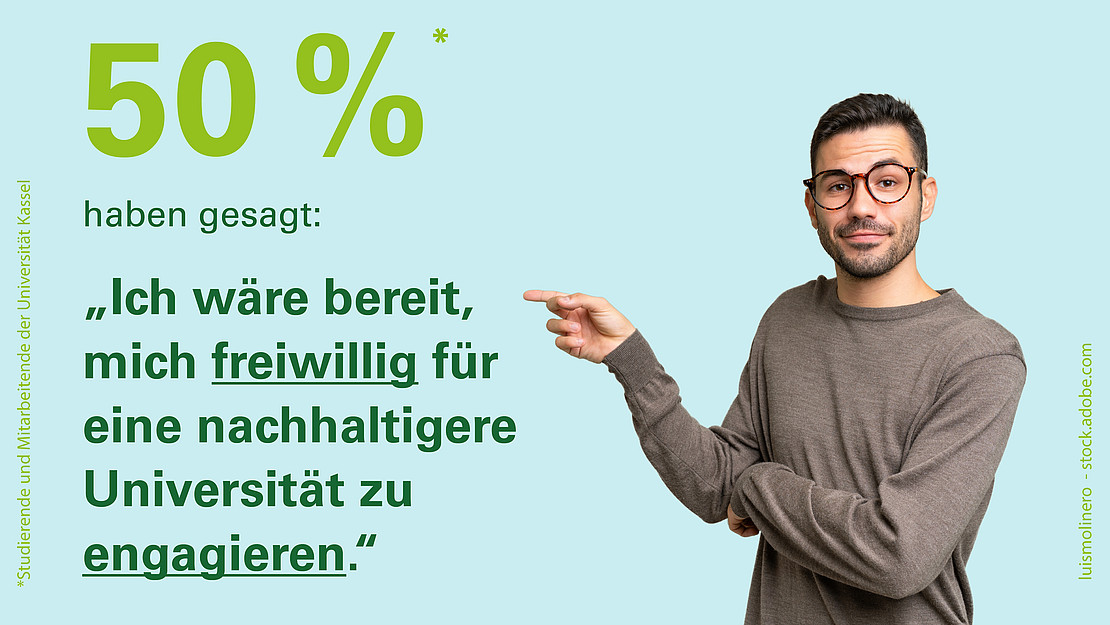The content on this page was translated automatically.
Second survey on the sustainability strategy: results are in!

Promoting sustainable development at the University of Kassel has been an important concern of the Green Office for two and a half years now. A lot has happened during this time: ideas workshops have been held, working groups (Sustain Groups) have been established for participation and the project seminar program I Go: Green and an ideas management platform "Project Factory" have been set up. In addition, steering committee meetings were established with the specialist departments and the first - not always visible - measures were implemented, such as sustainability principles for business trips, drinking water dispensers, bicycle boxes and parking facilities, guidelines for sustainable catering and more. However, the Green Office only ever initiates and supports the measures; many measures are implemented independently by the specialist departments.
The second online survey took place from May to July 2024 under the title "Establishing a participatory sustainability strategy at the University of Kassel". The aim was to determine attitudes and behaviors among students and employees and to survey their perception of the university's sustainability efforts, climate protection measures and ideas, wishes and expectations. In order to identify optimization potential for the strategy process and to be able to take up suggestions. Nadine Chrubasik, who developed the survey, reports that "the participation of students and staff is unfortunately rather low again, with 1,500 responses. But it still gives us information about how well or less well our sustainability efforts are perceived. It is a small success that students and employees now agree with 50 percent of the statement: "I know where I can find contact persons at the university if I want to work towards more sustainability and/or have questions about sustainability". This shows that we have already achieved better findability and visibility".
Interest in volunteering for sustainable development at the university has also improved, with 50 percent agreeing. In the previous year, 12 percent fully agreed with the statement "I would be willing to volunteer for a more sustainable university" and 32 percent still agreed with this question with "somewhat agree".
Another point shows that 40 percent are willing to get involved in participation formats for sustainable development, whereas in the previous year, only 9 percent fully agreed and 25 percent agreed with "somewhat agree". In response to the question "On a scale of 1 to 6, how well informed do you feel about the university's corporate sustainability development?", 29% chose a grade of 3.
It is encouraging that students and employees are aware of the measures taken by the university to improve energy efficiency. 54% agreed with the statement "The university is taking measures to improve energy efficiency and reduce electricity consumption and costs". However, many students and employees do not know that the university obtains a large proportion of its electricity from renewable energy sources. Here, 82 percent chose the answer option "don't know". The situation was similar for the following statements: "The university promotes measures for the efficient use of resources to reduce climate-damaging emissions as part of university operations", "In procurement/purchasing, the university attaches great importance to products that conserve raw materials, are low-waste, repairable, low-emission and recyclable" and "The university takes measures to increase biodiversity". Most participants selected the answer option "Don't know". 31% of employees were aware of the sustainability guidelines, 59% chose the "don't know" option and 10% answered "no". Overall, it is clear that a lot of information still needs to be better prepared and communicated.
To improve visibility, a new sustainability website has already been set up by the Communications and Marketing department. In addition to the Green Office, it also presents all other organizational units in the area of sustainability: Kassel Institute for Sustainability and UniKassel Transfer with the SDG+Lab. The Green Office has also introduced a newsletter, an Instagram channel, regular action days, events and exchange meetings as well as visits to the dean's office. These activities also help to raise awareness of the topic and initiate a participatory sustainability process. In this way, effective structures and conditions have already been created within a very short space of time in order to place the topic of sustainability at the university in general and in the core areas.
When evaluating the wishes, suggestions, tips and ideas, it became apparent that campus design is a concern for many students and employees, with 153 comments submitted. Nadine Chrubasik explains: "We see that a better flow of information is needed here, we are currently in the process of making the concepts for the planned optimization measures, which are currently being developed by Birte Resow from the Stadtlandschaft project office and the K1 landscape architects, Axel Klapka, accessible to the university public and promoting cooperation on sustainable campus design, such as "Campusverschönerung" or "Grün stadt Schotter", in order to better involve students."